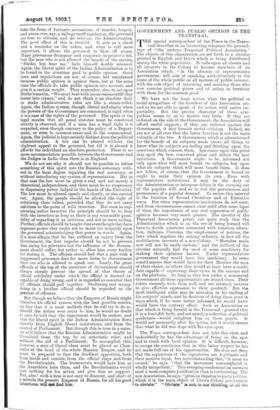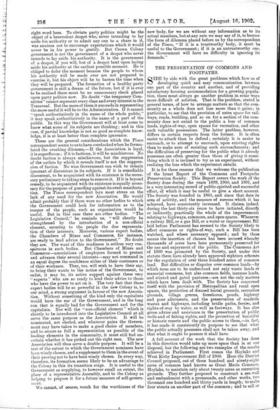GOVERNMENT AND PUBLIC OPINION IN THE TRANSVAAL.
r HE special correspondent of the Times in the Trans- ./ vaal describes in an interesting telegram the proceed- ings of " the embryo Transvaal Political Association." The objects of this organisation are set forth in a circular printed in English and Dutch which is being distributed among the white population. It calls upon all classes and all interests in the Colony to become members of an Association which, " in the absence of representative government, will aim at speaking authoritatively in the name of the whole public on all matters of public interest, with the sole object of informing and assisting those who now exercise political power and of acting in harmony with them for the common good."
We have not the least notion what the political or racial sympathies of the founders of this Association are, and so we are able to speak of its action with entire im- partiality. But the precise character of these sym- pathies seems to us to matter very little. If they are enlisted on the side of the Government, the Association will afford useful support ; if they are enlisted against the Government, it may furnish useful criticism. Indeed, we are not at all sure that the latter function is not the more valuable of the two. A Government which is administered for the benefit of its subjects needs above all things to know what its subjects are feeling and thinking upon the questions which concern them. Ignorance upon this point may spoil the best conceived plans and defeat the best intentions. A Government ought to be informed not only upon what will most benefit its subjects, but upon what its subjects think will most benefit them. It does not follow, of course, that the Government is bound or ought to make their opinion its own. Even with representative institutions it may be the duty of the Administration to interpose delays in the carrying out of the popular will, and so to test the genuineness and permanence of a popular demand. To secure this interval is the function of Second Chambers and of Executive vetos. But when representative institutions do not exist, and from circumstances cannot exist until after some lapse of time, the importance of any real expression of public opinion becomes very much greater. The circular of the Transvaal Association points out quite truly that the Administration which is on the eve of being formed will have to decide questions connected with taxation, educa- tion, railways, Customs, the employment of natives, the laws which regulate the mining industry, in fact all the multifarious interests of a new Colony. " Mistakes made now will not be easily undone," and the authors of the circular naturally feel the need of some machinery for making their opinions known. Under representative government they would have this machinery. In some constituencies they would have for their Member the man of their choice, in others they would at least have a candi- date capable of expressing their views in his canvass and on the platform. So long as they live under a nominated Government all these opportunities are denied them. Their rulers sincerely wish them well, and are sincerely anxious to give effective expression to their goodwill. But the most intelligent ruler may be mistaken in his reading of his subjects' minds, and be desirous of doing them good in ways which, if he were better informed, he would knew would have the contrary effect. Such an Association as that which is being formed in the Transvaal—granted that it is a bond-fide body, and not merely a collection of political quidnuncs—would enlighten him on these points. It would not necessarily alter his action, but it would ensure that what he did was done with his eyes open.
The Times correspondent does not take this view, and undoubtedly he has the advantage of being on the spot and in touch with local opinion. It is difficult, however, to escape the conclusion that in this latter respect he has not made full use of his opportunities. He does not deny that the aspirations of the signatories are legitimate and their motives loyal; but notwithstanding this, " it must be owned," he says, " that the movement contemplated is wholly inexpedient." This sweeping condemnation seems to need a more complete justification than is forthcoming. The new Association, he says, "gives an impetus to party politics, which it is the main object of Crown Colony government to obviate." " Obviate ' is not, to our thinking, at all the right word here. To obviate party politics might be the object of a benevolent despot who, never intending to lay aside his authority or to admit any one to a share in it, was anxious not to encourage expectations which it would never be in his power to gratify. But Crown Colony government is not the government of a despot who never intends to lay aside his authority. It is the government of a despot, if you will, but of a despot bent upon laying aside his authority at the earliest possible moment. He is obliged to defer the moment because the people to whom his authority will be made over are not prepared to exercise it, but his object will be to hasten the time when they will be prepared. The formation of a healthy party government is still a dream of the future, but if it is ever to be realised there must be no unnecessary check placed upon party politics now. No doubt "the temporary Com- mittee" cannot represent every class and every interest in the Transvaal. But the more of them it succeeds in representing the more useful it will be to the Administration. If it cannot " speak authoritatively in the name of the whole public," it may speak authoritatively in the name of a part of the public. In this way the Government will at least come to know what some of its subjects are thinking ; and in this case, if partial knowledge is not so good as complete know- ledge, it is at least better than complete ignorance.
These are the general considerations which the Times correspondent seems to us to have overlooked when he formu- lated the crushing dilemma,—If the Association is loyal, it is superfluous ; if it is factious, it will be mischievous. No doubt faction is always mischievous, but the suppression of the outlets by which it reveals itself is not the suppres- sion of faction. No wise Government can wish to remain ignorant of discontent in its subjects. If it is remediable discontent, to be acquainted with its existence is the neces- sary preliminary to taking steps to remove it. If it is beyond remedy, to be acquainted with its existence is equally neces- sary for the purpose of guarding against its overt manifesta- tion. The Times correspondent lays most stress on the lack of any need for the new Association. He would admit probably that if there were no other bodies to which the Government could look for information as to the temper of the people, such an organisation would be useful. But in this case there are other bodies. "The Legislative Council," he reminds us, " will shortly be strengthened by the introduction of a non-official element, securing to the people the due representa- tion of their interests. Moreover, various expert bodies, the Chambers of Mines and Commerce, for instance, are ready to lend advice to the Government." No doubt they are. The want of this readiness is seldom very con- spicuous in such bodies. But Chambers of Mines and Commerce—associations of employers formed to protect and advance their several interests—may not command in an equal degree the confidence either of their customers or of their workmen. They, too, will wish to have their say, to bring their wants to the notice of the Government, to enlist, it may be, its active support against these very " experts " who are so ready to lend their advice to those who have the power to act on it. The very fact that these expert bodies will be so powerful in the new Colony is, to our mind, a strong argument in favour of the new Associa- tion. Without something of the kind only the capitalists would have the ear of the Government, and in the long run that is equally bad for the Government and for the capitalists. Nor will the " non-official element " which is shortly to be introduced into the Legislative Council at all serve the same purpose as the Association. It will be nominated, not elected, and whatever pains the Govern- ment may have taken to make a good choice of members, and to secure as full a representation as possible of the leading elements in the community, it must still feel un- certain whether it has picked out the right men. The new Association will thus serve a double purpose. It will be a test of the extent to which the Government nominees have been wisely chosen, and a supplement to them in the event of their proving not to have been wisely chosen. In every way, therefore, its formation seems likely to be an advantage to the Colony in this its transition stage. It is useful to the Government as supplying, to however small an extent, the place of a representative Assembly, and to the Colony as helping to prepare it for a future measure of self-govern- ment.
We cannot, of course, vouch for the worthiness of the new body, for we are without any information as to its actual members, but at any rate we may say of it, to borrow the form of dilemma placed before us by the correspondent of the Times, " If it is a trustworthy body, it must be useful to the Government; if it is an untrustworthy one, the Government will have no difficulty in ignoring its demands."



































 Previous page
Previous page